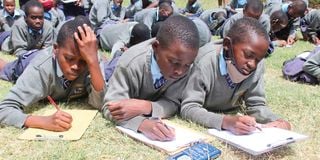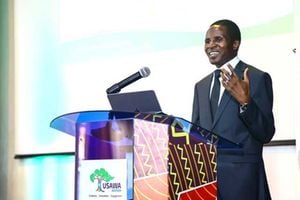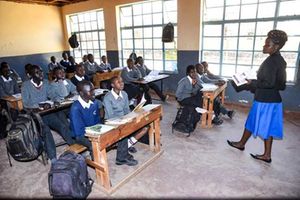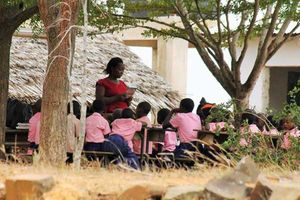
Grade Five pupils at Molo Academy Primary School in Nakuru County revise outside their classroom ahead of the Competency-Based Curriculum Assessment on February 1, 2022.
The Kenya National Examinations Council (Knec) is in advanced stages of preparing to conduct a pilot end of junior school assessment before October in all the 47 counties.
The pilot will be in preparation for the administration of a summative assessment in 2025 that will see the pioneer competency-based curriculum (CBC) learners transition to senior school. The assessment will be in two parts and will be used to place learners in the various pathways in senior school and will involve multiple-choice questions.
A learner’s final score will be a combination of the summative assessment and the school-based formative assessments undertaken in Grade Seven and Eight.
The assessment will replace the Kenya Certificate of Primary Education (KCPE) examinations whose last edition was administered last year.
In the new dispensation, the assessment will be referred to as Kenya Junior School Education Assessment and will be computed as follows: 20 per cent from the Kenya Primary School Education Assessment at the end of Grade Six, 20 per cent from school-based assessments in Grade Seven and Eight and 60 per cent from the Grade Nine summative assessment.
“We aim to distribute the necessary tools to evaluate their effectiveness, ensuring readiness by October when schools close. Summative assessment papers, which were formerly referred to as examination papers, will be provided to five schools in each of the 47 counties, totalling to 235. These papers will serve as samples for candidates gearing up for the 2025 junior school summative assessments.
“By making these materials available, both students and teachers can become acquainted with the assessment format, reducing any concerns or uncertainties. Our objective is to guarantee the nation's readiness for the assessment in the following year,” said Knec CEO David Njeng’ere.
Dr Njeng’ere highlighted the importance of both constructed response items and selected response questions.
“The constructed response tasks, which involve providing free-form answers, such as structured compositions or analysis, are primarily administered through school-based assessments, particularly at the primary level,” he said. “However, during formal summative evaluations, only selected response items, like multiple-choice questions, are utilised. This means that nothing is overlooked.”
He emphasised the need to nurture students’ individual potential beyond traditional achievement while considering personal attributes and personality traits in determining students’ career pathways instead of solely relying on academic achievements.
“Understanding your potential goes beyond mere academic test results. For instance, having top grades in biology, chemistry and mathematics doesn’t automatically qualify you to be a doctor. Personal attributes, particularly personality traits, play a crucial role in determining suitability for a profession,” he said.
The Knec boss explained CBC aims to ensure that at least 60 per cent of learners take up science, technology, engineering and mathematics (Stem) pathway, with 25 per cent pursuing social sciences and 15 per cent focusing on arts and sports.
Noting the importance of aligning educational choices with the country’s economic opportunities, Dr Njeng’ere cautioned against pushing students into pathways that might not offer sufficient prospects upon graduation.
Additional reporting by David Muchunguh









